As FlagShakes’ last show of the season prepares to take the stage this Friday, we wanted to hear from the powerhouse women behind the roles of traditionally-male players.
We know you’ll love hearing from them as they’ve put tons of work and intention behind making this an incredible storytelling experience for you. We sat down with Katherine Stewart, who is playing Prospero and Cadence Lamb, who is playing Ariel to learn more.
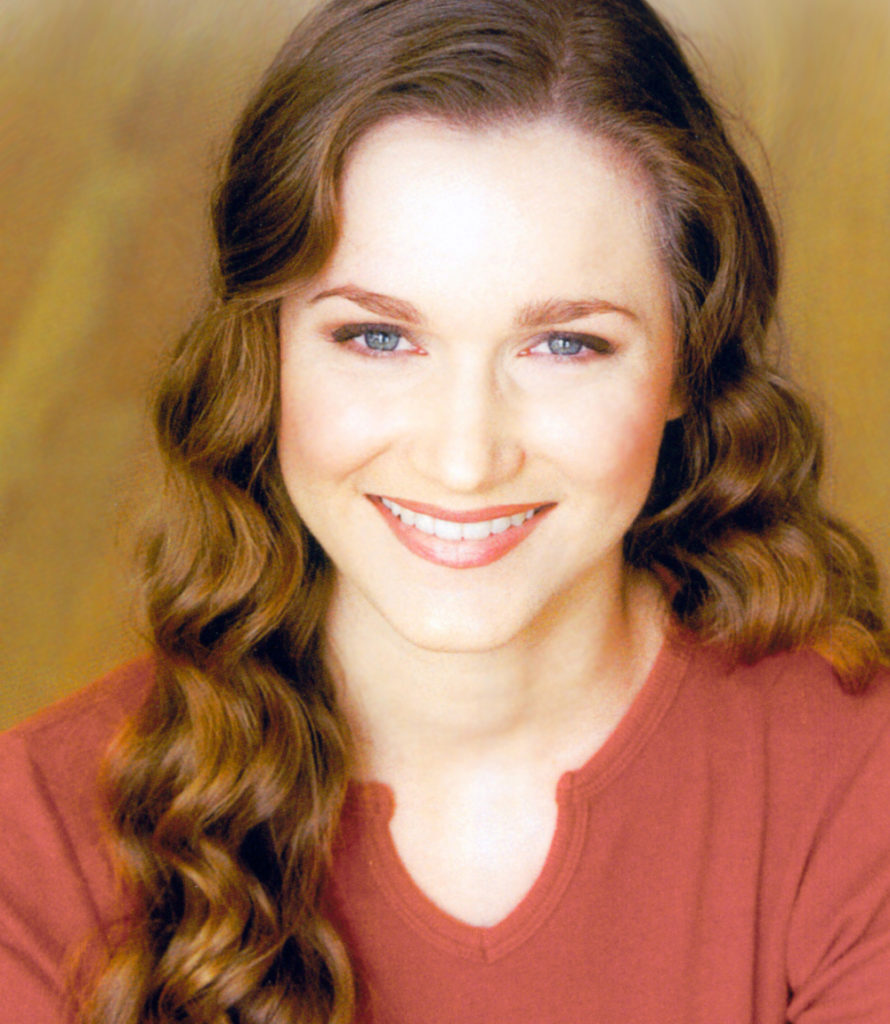
What has been your favorite role with FlagShakes?
This is my first opportunity to work with FlagShakes, so my favorite role would be this one! I hope that I’ll have the chance to add more roles in the future.
How does this role compare to others you’ve done?
Prospero is a person with a lot of difficult lived experiences. He has been betrayed by family and made an outcast. He is obsessed with knowledge, and to a very real extent, control. Control was taken from him when his kingdom was usurped, and so the way he tames the island, the spirits, and even the waves show him regaining control of his own existence. I think Prospero is a unique character because he is not acted upon – his struggles happen before the play begins. What we see is his personal Act Five.
Do you have a dream role, Shakespeare or otherwise?
I would give a heck of a lot to play Isabella in Measure For Measure. She’s so beautifully flawed.
What’s your favorite quality of this character? Least favorite?
I love Prospero’s world-weariness. I’m not wild about his temper.
Since these roles have been performed by thousands of people, do you have a new take? What are you hoping to highlight in this production?
Christine has counseled the cast to simply “tell the story.” So my goal is no overt agendas or hot takes, and the audience will take away what speaks most to them.
How important is the relationship between these two characters? How are you tackling that in rehearsals?
The relationship with Prospero and Ariel is interesting because of the dynamic alternates between master/servant and parent/child. Ariel is excitable and flighty, which is a big contrast to Prospero’s deliberate plotting and reflection. Ariel is innocent and unwise; Prospero is embittered and pragmatic. They are two ends of the same scale.
How does FlagShakes’ commitment to original staging practices help you communicate the character?
I can’t think of another company that would do a completely gender-reversed casting of such an iconic show. There just wouldn’t be the opportunity to speak these words. I actually get to say “We are such stuff as dreams are made on” and check it off my bucket list. Amazing!
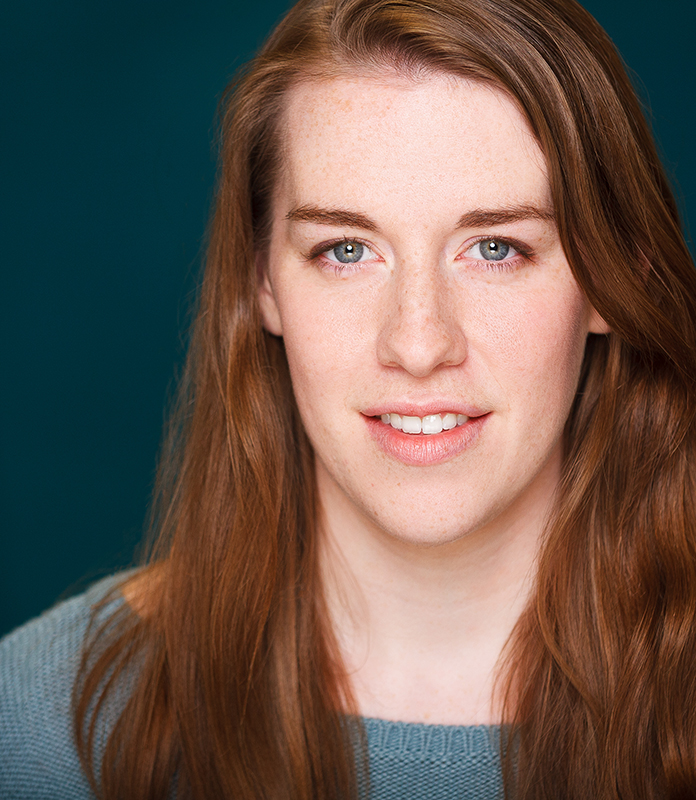
What has been your favorite role with FlagShakes?
I don’t think I can count Ariel, because I’m still in that process, but he very well may be my new favorite. But for now, I will go with Friar Lawrence in Romeo and Juliet. When I first got my offer, I was sure it was a mistake. I mean, I certainly wouldn’t have figured I’d be playing a middle-aged man anytime soon if ever. But as I started to get to know the character, I realized he and I really do have a lot in common, like our priorities and how we respond to a crisis. That’s something I’ve always admired about Flagshakes. They cast based on inner qualities of the actor before assessing physical attributes, which is why I think this gender-reversed production of The Tempest works!
How does this role compare to others you’ve done?
Ariel is incredibly different from any role I’ve done, mainly because he isn’t human, he’s a spirit. I have reveled in exploring his movement outside of a typical human’s social boundaries. It’s also fun in that he is invisible to most characters for the whole play, which gives me many opportunities to earn the title “tricksy spirit” that Prospero gives me.
Do you have a dream role, Shakespeare or otherwise?
Fortunately, I have already played two of my dream roles: Constance in King John and Princess Winifred in Once Upon a Mattress. But I would certainly play either again in a heartbeat.
What’s your favorite quality of this character? Least favorite?
We have decided that our version of Ariel is solely focused on the present. He is fully encompassed in whatever is right in front of him and nothing else in the universe matters. I wish more people, including myself, had more of this quality. Certainly, not to the extent at which I’ll be playing it, but I do think it’s a reminder to experience and fully invest in your present as it happens, instead of getting caught up in your head. My least favorite attribute is that Ariel has absolutely no ambition. He only stands up for himself once in the play and just follows orders for the rest of it (even though he is clearly the most powerful thing on the island in terms of magic).
Since these roles have been performed by thousands of people, do you have a new take? What are you hoping to highlight in this production?
I have actually never seen a production of The Tempest, whether live or on film. And I don’t plan to until after we close. It’s far more freeing to create the character strictly from the text and who I am without the interpretations of others in my head. That being said, I hope to highlight his sense of focusing on the present and his immersive curiosity and wonder that it seems only children and spirits have ;).
How important is the relationship between these two characters? How are you tackling that in rehearsals?
It was important for us to view the relationship both from an objective perspective as well as from our characters’. Objectively, Prospero is taking advantage of Ariel and using his powers where he could have just immediately set him free. However, when viewed through our characters’ lenses, Ariel is happy to serve a master he views as more moral and loving than his past master. And Prospero enjoys Ariel’s presence beyond just using his powers as a tool. Of course, other productions could choose to highlight other aspects and treat it more like an enslavement, but we chose to play it more like a loving, if slightly not fair, bargain between good friends.
How does FlagShakes’ commitment to original staging practices help you communicate the character?
First of all, this is my second time working with Christine and I am so grateful for it. Her knowledge of how to interpret the text across the whole canon is priceless and hard to come by. As far as staging goes, I have certainly appreciated the freedom I have been given to be amongst the audience and roll around the stage. Flagshakes is always good about including the audience and making them feel a part of the story wherever possible.
The second show in our 2018 season, Titus Andronicus, remains popular, and as Titus Director/FlagShakes Executive Director Dawn Tucker put it:
OUR PRODUCTION WILL BOTH LEAN INTO THE ABSURDITY PERCEIVED BY THE MODERN AUDIENCE AND PROVIDE, THROUGH MOVEMENT AND MUSIC, VISCERAL PATHWAYS TO UNDERSTANDING IT IN A MODERN CONTEXT.
We wanted to know what the cast was doing behind the scenes to get ready for such a show, so we sat down with Vicki Thompson (Titus) and Christian Tripp (Lucius) to find out more.
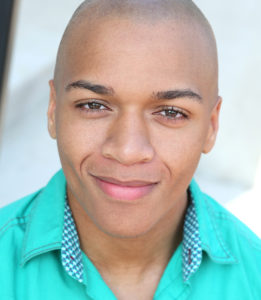 What has been your favorite role with FlagShakes?
What has been your favorite role with FlagShakes?
CT: This is my First time with FlagShakes, but I love making discoveries as Lucius in Titus Andronicus!
VT: Titus Andronicus is, by far, my favorite and most challenging role with FlagShakes.
How does this role compare to others you’ve done?
CT: This is my first full Shakespeare role, so automatically that has a few new things like the language to keep in mind. However, I have played soldiers quite a few times now, and what I always carry over is making sure I’m actively chasing an objective.
VT: Titus may be one of my favorite Shakespearean roles, period. Although Gertrude, in Hamlet, was quite delicious to play as well. But in Titus, I play a role traditionally played by a man, and that makes it more exciting because people don’t expect it and (hopefully) are curious.
Do you have a dream role, Shakespeare or otherwise?
CT: My dream role is Iago from Othello. I love the idea of portraying characters in ways they aren’t normally seen. To be able to take one of Shakespeare’s most beloved characters, do something not often done, and unlock the reasoning behind why he is the way he is would be an amazing experience.
VT: I don’t have a dream role at this time because fortunately, I have played a lot of them. I wouldn’t mind being in a Coen Brothers movie or some “over the top” children’s theatre villain.
 What’s your favorite quality of this character? Least favorite?
What’s your favorite quality of this character? Least favorite?
CT: My favorite quality of this character is how stable Lucius is. Lucius has been through so much at the start and end of this play, but he has to keep it together for his family. He is a fighter, and he can’t drop his guard or else his family and kingdom crumble. My least favorite quality lies in how he never uses his smarts to find peace; instead, he evokes more violence and revenge until the very end.
VT: Titus Andronicus is, by far, the most challenging and exhilarating role I have played in the relatively small catalog of Shakespeare roles I have had the honor to inhabit. I feel blessed to be trusted with such an iconic part. The complexity of this “revenge” play gives me, as a woman, the opportunity to explore complicated emotions as a soldier just home from war and as a mother seeking retribution for her many (many, many) sorrows.
Since these roles have been performed by thousands of people, do you have a new take? What are you hoping to highlight in this production?
CT: What I am hoping to highlight in Lucius is yes, he is a great warrior, but he is someone who thinks, too. I want my take on Lucius to be layered with three-dimensional qualities of holding back his rage for the sake of keeping a cool head for his family. With Titus on the verge of insanity, he can’t afford to lose.
VT: Without giving too much away…I am delving into the themes of family, as only a mother can, and coming up for air just long enough to assess the damages and by my own hand, in some cases, level the playing field.
How important is the relationship between Titus and Lucius? How are you tackling that in rehearsals?
CT: Everything I do is for Titus and to support her. I want to prove to her that I am a worthy son; it is my way of thanking her for taking care of me throughout war times. Because of this relationship, Titus feels she can trust me without hesitation over anyone else—my loyalty to her is unyielding.
VT: The relationship between Titus and her son Lucius is an extremely important one. They have been career soldiers together, so they’ve been trained to trust each other in a battle zone, which, unfortunately, helps them navigate back at home. Christian Tripp and I have been discussing gene pool issues and are working with the lines to find the bonds. Christian calls me “mom” and last night I called him “sweetums,” so the relationship is definitely building.
How does FlagShakes’s commitment to original staging practices help you communicate the character?
CT: The staging helps me communicate the character by allowing me to fully communicate with the other characters. My need to talk becomes so great that the words flow out without stress. The stage is filled with juicy tension, which causes interesting choices to emerge in a free environment.
VT: FlagShakes, as an organization, is expanding the horizons of this, “our little mountain town,” and finding ways to explore and increase the excellence of the arts community. With Dawn Tucker at the helm and all the dedicated board members, this venture stands on solid ground and will only get better and stronger in the years to come. Be prepared for big things from this company. I feel more than fortunate to play Titus Andronicus. Come along for the ride—you won’t be disappointed.
Right now, in the Allen Elizabethan Theatre at the Oregon Shakespeare Festival in Ashland, Oregon, a new play is in the repertory. It was written by (fun fact) the most-produced American playwright of the current theatre season (outside of Shakespeare), Lauren Gunderson. The play is called The Book of Will and concerns the assembly and printing of the so-called First Folio edition of Shakespeare’s plays, published some seven years after his death. I haven’t seen or read the play (more than what’s freely available online, that is), but it is billed as a sort of paean to the Bard and his works; a lively, if fanciful, history of events we know very little of, sad to say, but which by golly we’re glad occurred (however they occurred) because without them you wouldn’t be reading this—nor coming to various sites in beautiful northern Arizona settings to see Flagstaff Shakespeare Festival performances.

“What if all the words were lost?” poses a headline at O-Shakes’s web page about the play. What indeed. The world would be a very different place, no doubt whatsoever. Well, for one thing, there’d be no Shakespeare festivals anywhere—beautiful outdoor settings or not! And so much more than that: the whole rich, heart-opening, weep-inducing, belly-laughing, tragical, astounding, uproarious mess that is Shakespeare’s canon—gone! A void in the world? Nay, a veritable cavernous maw, I say!
Whoa, dial it down, Ben. We’re all on the same page here—those brilliant, scintillant pages that Heminges and Condell managed to wrest from the transient flux of Elizabethan (well, Jacobean) life 400 years ago. May your place in Heaven be assured, you great men of the theatre!
And truly, that’s the crux: these forward-looking men committed to paper (itself a transient form, but let that go) those great stories and poetry of the King’s Men’s man. Think about that: dramatic art on paper. The soaring words and themes and living drama of the Western world’s greatest dramatist flattened out like so many squashed ants. How could it be done? More importantly, how can those squashed ants be resuscitated into living drama once again? How can those dry, flat symbols magically expand into three dimensions? Four—bodies in motion in space and voices on the air!
As a symphony orchestra brings to life the great works of Mozart or Beethoven or Mendelssohn from the lifeless lines and dots of a symphonic score, we, a company of actors, must first interpret, then breathe our own life into, this flat suggestion of an idea of a concept! Impossible!
And yet…
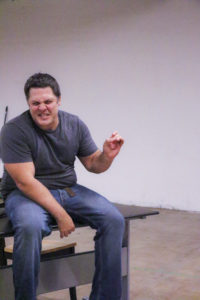 As the text and speech coach for Flagstaff Shakespeare’s production of The Taming of the Shrew, that’s the nut I’m trying to crack. And such a delicious, impossible nut! Our director, Jesse Kamps, and fearless leader Dawn Tucker have entrusted me with the task of helping my fellow actors bring to vibrant life the “mere words” of a man 400 years dead. My task is twofold. The first part is to make sure the actors understand the text. What do the words mean? What is the sense of a phrase, a line, a speech? What is happening in the scene? Does this word or phrase mean the same thing now as it did when Shakespeare wrote it? The second part is to make sure the audience understands the same text, but this time as speech. The difference between text and speech, though it may appear largely mechanical (anyone who can read could do it, right?), is fraught with challenges. And the difference between merely well-spoken text and living, breathed-and-breathing Shakespearean language that is both comprehensible and bursting with meaning—well, that’s another matter entirely.
As the text and speech coach for Flagstaff Shakespeare’s production of The Taming of the Shrew, that’s the nut I’m trying to crack. And such a delicious, impossible nut! Our director, Jesse Kamps, and fearless leader Dawn Tucker have entrusted me with the task of helping my fellow actors bring to vibrant life the “mere words” of a man 400 years dead. My task is twofold. The first part is to make sure the actors understand the text. What do the words mean? What is the sense of a phrase, a line, a speech? What is happening in the scene? Does this word or phrase mean the same thing now as it did when Shakespeare wrote it? The second part is to make sure the audience understands the same text, but this time as speech. The difference between text and speech, though it may appear largely mechanical (anyone who can read could do it, right?), is fraught with challenges. And the difference between merely well-spoken text and living, breathed-and-breathing Shakespearean language that is both comprehensible and bursting with meaning—well, that’s another matter entirely.
Consider how we humans communicate. Before the advent of all our many analog and digital communication devices, human communication (aside from writing) was a full-body experience. For those possessed of all senses, we “spoke” across the wide bandwidth of sight and sound, producing a complex of audio-visual information directed to the receiver. You don’t have to be Italian to appreciate the value of a good gesture! In the Digital Age, we’ve constricted that bandwidth enormously, into narrow streams of inflexible data that tend to denude, rather than enrich, communication. Just think of how often intentions are mistaken in a text message or an online comment thread and you’ll know exactly what I’m on about.
Shakespearean language, though essentially modern English (technically “early modern English”), is different from our contemporary English not so much because of linguistic changes in vocabulary, syntax, and grammar—though these do differ, somewhat, from ours—but because of the particular ways Shakespeare used the language at his disposal.
He pushed its boundaries and then cracked it wide open. I imagine that, were he alive today, he would be writing things as newfangled and mind-blowing now as they must have seemed to the Elizabethans then. He rose above the limitations of his own language and made it a servant to his art. That’s what makes it hard to understand more than the changes in English over the centuries. He was a poet—he used language differently from others, elevated it to a new plane.
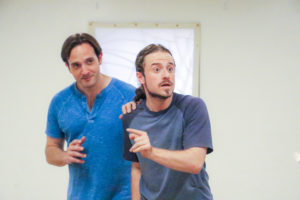
But in his plays Shakespeare wasn’t, strictly speaking, writing poetry—he was writing drama. It was meant to be seen and heard: enacted. So merely speaking the text aloud in a clear voice is insufficient to convey its complex meaning from actor to audience. The task requires another avenue, another methodology. I believe that methodology to be the subtle, unique combination of an actor’s understanding of the text expressed through a range of vocal properties (inflection, pitch, rhythm, pacing) plus the bodily aspects of acting: posture, gesture, facial expression, carriage, and more. Done well, the resultant mixture is rich with expression and can render complex and expansive ideas into a perceptible form that can be easily understood by an audience, regardless of the differences in the language itself.
And that’s where I’m investing my efforts as text and speech coach. I must examine each actor’s expressive output and evaluate its effectiveness, then help them to modulate or enhance that output when it is ineffective or its meaning is unclear.
That work requires an appreciation of the actor’s gifts and limitations, an ability to adapt to their style of learning, and a thorough knowledge of the tools available to assist them in this quest to convey meaning. Easy-peasy (he said hopefully)!
It is indeed fortunate that I find myself working with a cast with many gifts and a great enthusiasm to succeed in telling Shakespeare’s story. We’re all definitely committed to producing the clearest, most delightful, thoughtful and engaging Shrew that we possibly can. And you, our dear and commendable audience, will determine how well we have succeeded.
 Enjoy the show!
Enjoy the show!
Ben Gorman
As the 2018 FlagShakes season quickly approaches, we wanted to get behind the scenes and introduce you to some of the talented artists you’ll see on stage. We sat down with Ryan Jenkins, who is playing Katherine, and Keath Hall, who is playing Petruchio. We know you’ll love hearing more about them and the insights they bring to the roles.
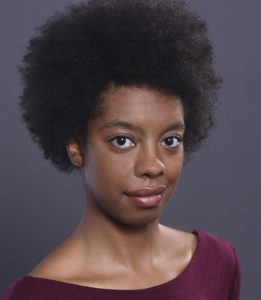 What has been your favorite role with FlagShakes?
What has been your favorite role with FlagShakes?
RJ: This is only my second role with FlagShakes. When I played Third Witch/Third Murderer last summer, it was fun to have the opportunity to experiment with playing both a human and supernatural antagonist. Coming back this season has been amazing. Working with friends again, I feel like my favorite role so far has been being an actor in the company!
KH: Last year was my debut with FlagShake,s and I was honored to play Macduff and the bloody sergeant. Petruchio this year has been both challenging and exciting; thus far, it has been my favorite.
How does this role compare to others you’ve done?
RJ: Katherine is a force to be reckoned with. Similar to the Weird Sisters, she refuses to play by anyone else’s rules. People are drawn to her but also fear her. However, the fact that she is a love interest presents unique challenges I didn’t have playing a witch. I have played a headstrong woman-in-charge before, and I have played a love interest/ingenue, but Katherine is the first role where I have to be a combination of the two. She’s more aggressive and violent than Beatrice [in Much Ado About Nothing] but shares the same sharp intellect and wit.
KH: Petruchio is odd and an extremely unreliable source of information in the play. Macduff is a pretty straightforward, straight-laced character. A character like Falstaff is at least a consistent liar, while Petruchio is unpredictable in behavior and ideals. At times, his words seem patriarchal, but at other times he seems to be wholly set against that same system. His language also shifts from something crass to that of elevated poetry. There is a lot more left open for interpretation depending on which moments the actor plays as sincere.
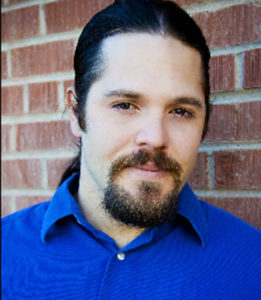 Do you have a dream role, Shakespeare or otherwise?
Do you have a dream role, Shakespeare or otherwise?
RJ: I would love to be Lady Macbeth, Portia (Merchant of Venice), and Titania (A Midsummer Night’s Dream). My dream role would be a performance capture or voice actor in a video game or movie (like “Avatar!)
KH: Still waiting for a Viking production of Hamlet. Otherwise, I have been eyeing Coriolanus for a while.
What’s your favorite quality of this character? Least favorite?
RJ: I love that Katherine fearlessly speaks her mind. “No” is a complete sentence to her (but she’s a Shakespeare character so she’s obligated to say more), and it comes without apology. She owns her intelligence. I don’t like that Katherine uses physical violence to get her way. I am not a confrontational or physically intimidating person, and I think it takes an unnecessary amount of energy to be someone who is—on stage or off.
KH: Petruchio has an energy and a grounded understanding of the world around him. This gives him some freedom to observe, comment on, and abuse some negative elements in people and society. That is fun. Unfortunately, to “end successfully” he also must impose his experience and worldview upon Kate, abusing her and several others in the process, for what he deems to be a greater good.
Since these roles have been performed by thousands of people, do you have a new take? What are you hoping to highlight in this production?
RJ: I think this role is an opportunity to explore my own ever-expanding beliefs regarding womanhood, relationships, gender roles, social conventions, love, and marriage and how to express those philosophies through Katherine. My experience with these aspects of life as a mid-twenties woman of color in a long-term relationship in 2018 has to lead to a uniquely complex perspective on Kate’s pathology and highlights how women today are still discovering and defending their own convictions on these lifestyle topics.
KH: The play is very much of a time and place, though it deals with some universal themes. Following the current issues regarding consent, the #MeToo movement and the state of feminism in the US, we have attempted to present the play in a way that asks questions to further these conversations as opposed to answering them.
My hope is to highlight the idea of marriage as a unification, a team. In this particular case, two broken people become an unstoppable force. We have set the play classically in a patriarchal world, and so to succeed the couple must play by those rules, at least superficially. Ideally, the audience will walk away contemplating the importance of love, sacrifice, and the value of a partner.
How important is the chemistry between these two characters? How are you tackling that in rehearsals?
RJ: Kate and Petruchio’s story has no dynamic without chemistry. Keath is not afraid to try anything and everything to get a reaction, which encourages me to stay as emotionally fluid as I can, and find moments where Katherine can be just as playful, witty, or impulsive!
KH: Kate and Petruchio are like fires that should build on each other. Ryan and I are good friends who are very passionate about these characters. There is a huge amount of trust we have put on each other and in our director Jesse Kamps. Negotiating the intimacy has been as honest and as safe a process as possible.
How does FlagShakes’ commitment to original staging practices help you communicate the character?
RJ: Direct address challenges me to remember I’m sharing with the audience just as much as my stage counterparts. Katherine’s biggest weapon is her tongue, so my dedication to fully expressing the language, physically and vocally, has to be as sharp and deliberate (and somehow effortless) as she is. She wants to be seen and heard at all times, so being committed to every emotion and making sure the audience sees and hears them will help them see beyond the shrew and discover her humanity.
KH: For me, there is a simplicity to it that lends itself to the actor. The focus on the performer and language helps to tell the story and limits the distraction. The connection is never clearer or more intimate with a patron than when you are looking an audience member in the eyes for the punchline to a joke or to decry tragedy.
When I first pick up a script and start to work on a character, I look for commonalities between myself and my experiences and the character and their experiences. I recognized May immediately. May was the darkly romantic vision I had of myself at 30 when I was 16. When you hear her story, it sounds thrilling. No attachments, no responsibilities, unbridled passion. In reality, it’s a very sad life. No family, no career, no stability.
As a feminist, I’m always interested in my character’s emotional, intellectual, and creative life, not just her romantic life. The thing with May is, she doesn’t have any passions besides Eddie. Often, in Shakespeare, I have played women who are very similar to May. Hopelessly in love and with no real idea of their future outside of the men they are aligned with. Somehow, May is more helpless than any of them. And this play definitely doesn’t pass the
Bechtol test. So, how, as a feminist, do I approach this kind of play?
It’s a strange thing for me, a woman with so many passions outside of romance. Happily, I have someone I choose to share my life with, but many of my pursuits are entirely independent of him, like teaching, creating, and learning. But just as strongly as I believe women have a right to agency outside the home, I believe the stories of women who live their lives for and with others deserve to be told. Their voices are not to be silenced; their lives are not of any less value. Now, I know a man wrote May and I know Shakespeare was a man as well, but to me, characters have lives beyond their authors, and it is an actor’s job to bring them fully to life.
Telling May’s story begins with a setting aside of judgments so that I can work on understanding her and, eventually, loving her enough to do justice to her story. It’s important because May’s story is full of truths that mirror the lives of many women — from the Renaissance to today. And they all deserve to have their stories told.




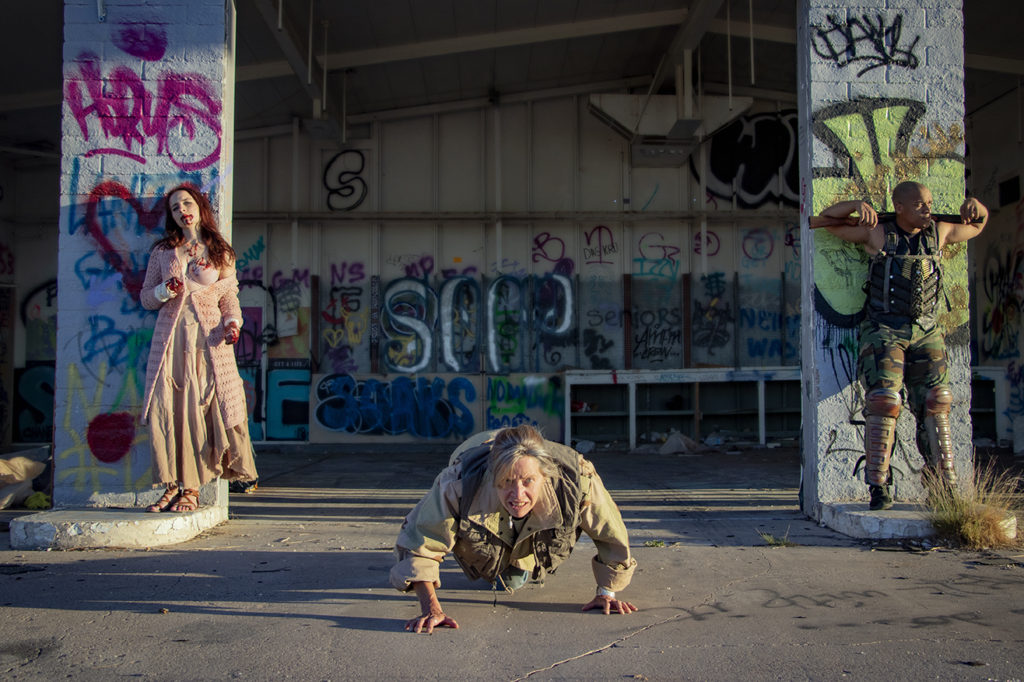
 What has been your favorite role with FlagShakes?
What has been your favorite role with FlagShakes? What’s your favorite quality of this character? Least favorite?
What’s your favorite quality of this character? Least favorite?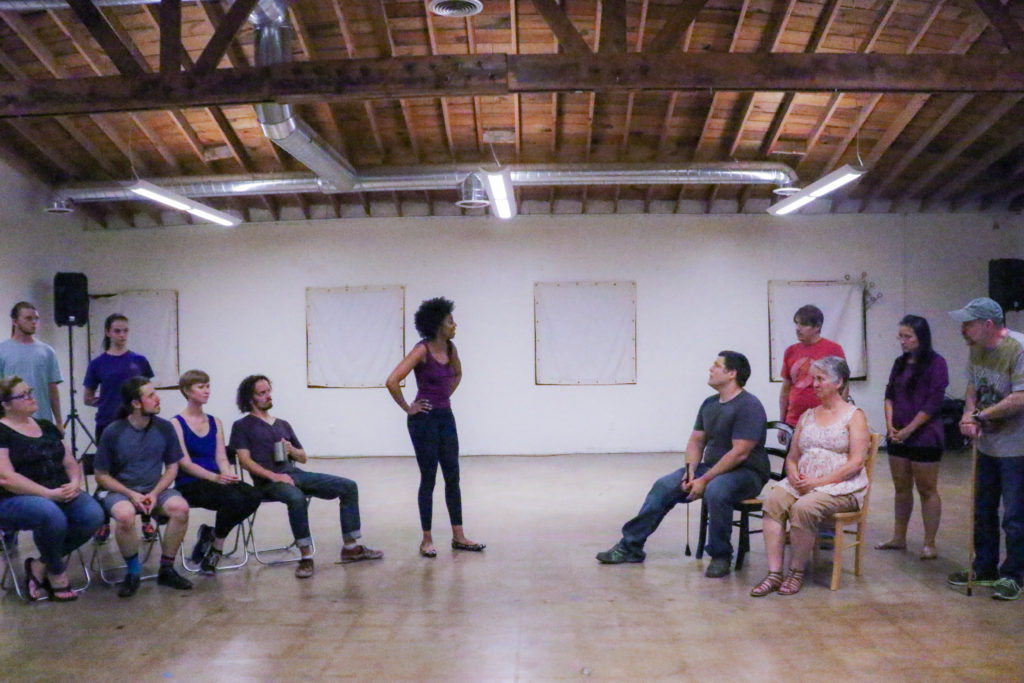

 As the text and speech coach for Flagstaff Shakespeare’s production of The Taming of the Shrew, that’s the nut I’m trying to crack. And such a delicious, impossible nut! Our director, Jesse Kamps, and fearless leader Dawn Tucker have entrusted me with the task of helping my fellow actors bring to vibrant life the “mere words” of a man 400 years dead. My task is twofold. The first part is to make sure the actors understand the text. What do the words mean? What is the sense of a phrase, a line, a speech? What is happening in the scene? Does this word or phrase mean the same thing now as it did when Shakespeare wrote it? The second part is to make sure the audience understands the same text, but this time as speech. The difference between text and speech, though it may appear largely mechanical (anyone who can read could do it, right?), is fraught with challenges. And the difference between merely well-spoken text and living, breathed-and-breathing Shakespearean language that is both comprehensible and bursting with meaning—well, that’s another matter entirely.
As the text and speech coach for Flagstaff Shakespeare’s production of The Taming of the Shrew, that’s the nut I’m trying to crack. And such a delicious, impossible nut! Our director, Jesse Kamps, and fearless leader Dawn Tucker have entrusted me with the task of helping my fellow actors bring to vibrant life the “mere words” of a man 400 years dead. My task is twofold. The first part is to make sure the actors understand the text. What do the words mean? What is the sense of a phrase, a line, a speech? What is happening in the scene? Does this word or phrase mean the same thing now as it did when Shakespeare wrote it? The second part is to make sure the audience understands the same text, but this time as speech. The difference between text and speech, though it may appear largely mechanical (anyone who can read could do it, right?), is fraught with challenges. And the difference between merely well-spoken text and living, breathed-and-breathing Shakespearean language that is both comprehensible and bursting with meaning—well, that’s another matter entirely.
 Enjoy the show!
Enjoy the show!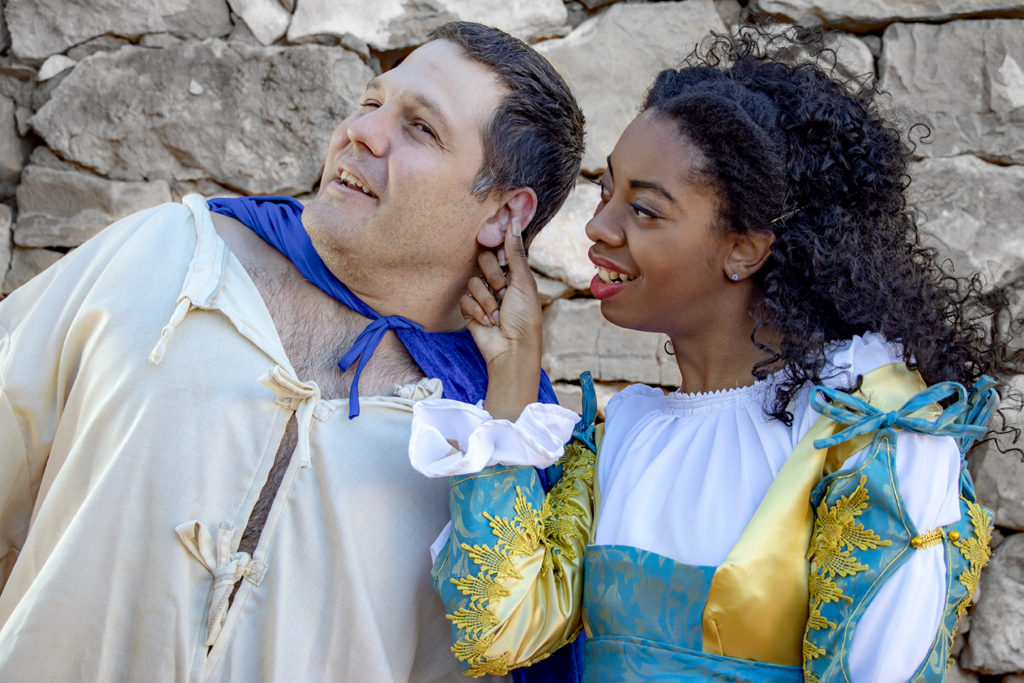
 What has been your favorite role with FlagShakes?
What has been your favorite role with FlagShakes? 
